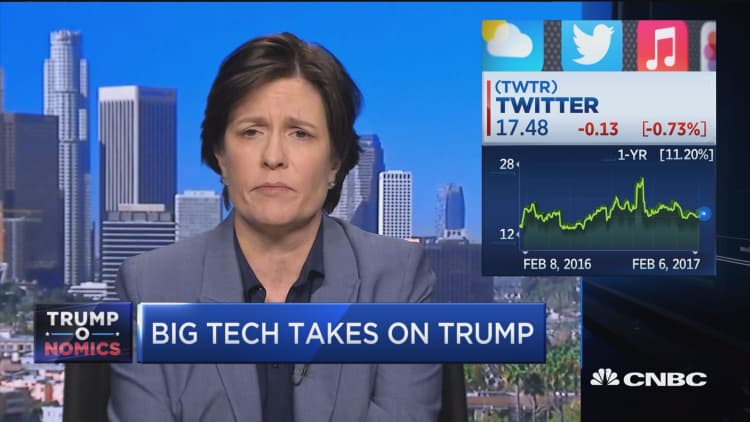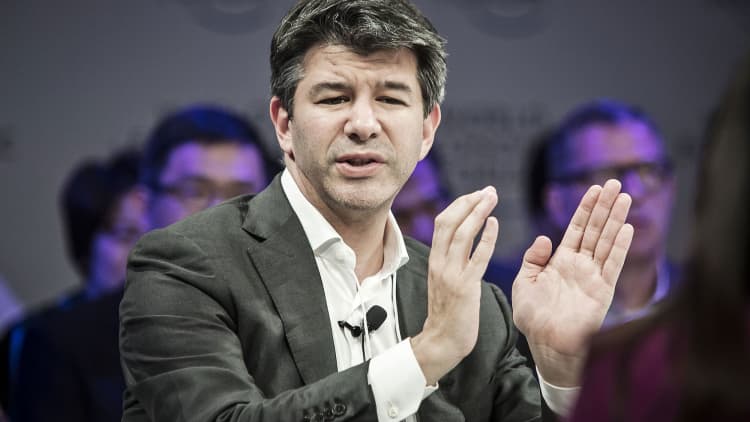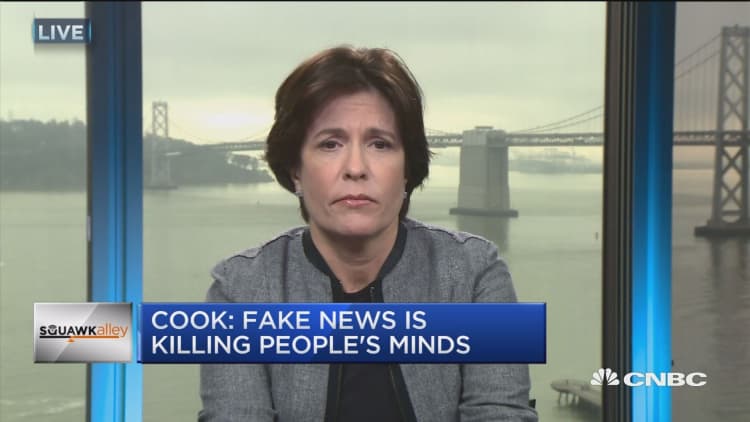It was pretty clear once I got on the phone last night with Mark Zuckerberg that he has become of late very, how shall we put it, woke.
"No one single event triggered this," said the Facebook CEO and co-founder in an interview, noting the heightening of ugly political discourse in the U.S. under President Donald J. Trump was not the impetus for a 6,000-word opus on his world view for the social giant's future that he released today. "I have been thinking about these things for a long time ... my views have just become more nuanced."
But in talking to a very intense Zuckerberg about his letter, which Facebook sources said he penned himself and pushed hard on issues he has largely avoided, his tone is of someone who knows that the solid earth he has been standing on has drastically shifted recently.
He's been thinking about that a lot lately, he admitted, as the noise around Facebook's role as a media distributor has grown deafening. "One thing I have been wondering recently is if people misdiagnosed is that the hope for the future is all economic," said Zuckerberg, who sounds a bit like a man reborn in this politicized age. "But the things that are happening in our world now are all about the social world not being what people need and I felt like I had to address that."
He can say that again — when I got the very packed and very long letter, which was still in process last night, my one single thought: Jesus.
I guess no surprise either, since the Facebook CEO and co-founder has always been the most earnest of leaders in Silicon Valley, perhaps even its most publicly agonizing, over a range of issues over the years.
More from Recode:
Snapchat is the most relevant platform for content and marketing, says AwesomenessTV CEO
Facebook is rolling out job postings and applications
CEO Jack Dorsey just bought $7 million in Twitter stock
But in penning all these words on the future of Facebook and, really, the world, he's taking one big giant step into another level of rumination that is big and complex and mostly a rat's nest of controversy for him.
Among the thorny topics that Zuckerberg tried to address in his letter artificial intelligence, fake news, terrorism, polarization of society and online safety.
The letter is also a real neck-snap shift from Zuckerberg's initial who-us? shrug after the election, as many blamed fake news running rampant on Facebook in part for the election results. Now, he seems to be inching forward to saying that the service has become the way many get their news and information these days and that matters.
Still, Zuckerberg is also trying to thread a very thin needle in distancing Facebook as the cause of all the fake news, "One of the ideas I am focused on is common understanding," he said. "If I could wave a magic wand and get rid of all misinformation, I would. But people would still use some sets of facts, the true facts, in order to fit whatever bias they have."

True that, but in acknowledging that Facebook has a big role to play in fixing the problem, he is also tacitly admitting it has been part of the problem.
The question going forward is whether Facebook supports this massive Mark Manifesto — which is precisely what it is — with just money and long letters. Or does it fundamentally change the way it works — as an attention slot machine that turns that attention into money — in order to support the ideas Zuckerberg has outlined.
While, in the interview Zuckerberg argued that it does not have to go that far, if he really thought Facebook did not have some level of responsibility, he wouldn't be typing so many, many words.
"I think we are at a point right now where a lot of people are asking how they can make the most positive impact in the world," said Zuckerberg, who said he wanted to put out this new vision most most specifically for employees. "If you want to change the direction and continue to bring the world together, [we have to define that.]"
Zuckerberg noted that this is "not a completely novel moment ... people always come together in larger numbers to support things like cities and nation." But what has struck him recently, he said, was a change in attitude about trying to do what Facebook has always done.
"The idea of connecting the world was not controversial, but now globalization has moved so quickly, many feel left behind and that is picking up in volume," he said, echoing his letter. "The question is do we come together more or reverse course and separate."
Zuckerberg obviously thinks the former, but in an even more turbocharged way. "We started with friends and family, which is the foundation of society. We always tried to offer that once we got out of the phase as a U.S. college service," he said. "We now have to build a global infrastructure that works for everyone."
Now, he think Facebook has to do more than that, including bringing different and disagreeing people together, while also trying to provide tools to build offline communities that have grown weaker over time
"No matter how good your economic structure, you are going to need a social structure to support you," he said, noting that Facebook has in the past been largely designed to support families and small groups that are created organically.
"If you use Facebook, most people have 30 or 40 groups, but only one or two that really matter to you and you use actively," Zuckerberg said. "People do not seek other kinds of people out to connect."
Thus, a push to provide more tools for unlikely people to connect around more areas and perhaps even push more people to do this on Facebook. "The best communities in the world have leaders," he said.
Obviously, the fake news issue is unavoidable for Zuckerberg, although he seemed to prefer to focus on something he calls "sensationalism" and ridding the world of it in favor of agreement.
"There is a lot of research that real common understanding is having nuanced understanding, things you agree with," he said.
But he did not let social media off the hook. "Social media and, to some degree, online news in general, are short form and there are some positives, because it forces people to focus their message," said Zuckerberg. "But there are negatives too. If all you have is a short message, you tend to oversimplify and you remove the nuance."
He is particularly concerned about the use of headlines as the only signal to online users. "In most news consumed on paper, the headline is not separate from the content," he said. "Online the headline is often the only indicator and that is a problem."
Zuckerberg seems to get how complex it is and how damaging fake news is to the Facebook platform. "Our community wants good information and no one ever said, 'I want misinformation,'" he said.
That said, he added: "We also do not want to tell people not to share ... The tension here is that I think that people should have the right to share things even if other people disagree with them. One way to deal is not to show it, when people do it in the most egregious way, but we are more likely to try to surface other perspectives in the news feeds.
Right now, though, he would not commit to creating a database of white-listed news sire. "I don't want to overpromise," he said, though he did note that Facebook is moving to cut off the economics of fake news providers, whom he likened to spam.
"We should not be that heavy handed about this, but try to do things to reduce the problem and a lot of the most egregious stuff is spam, put up by people with a really malicious financial motive make things up that are not true to make money from ads," he said. "One of the best ways to stop spam is disrupt the economics of it."
Still, Zuckerberg said that sharing more is still Facebook's creed. "Our philosophy is to give the most voice to the most people, not that everyone can say everything," he said. "I don't think we will be the ones to mark things as false. Our approach is to try to get community to do it and I would rather that it come from community rather than us."
Zuckerberg said all this big thinking was not prompted by the new presidential administration of Trump and he hardly referenced him and his social media impact, which has been largely negative.

But it's clear that Zuckerberg's goals here obviously go well beyond social networking, which will likely further increase the chatter around his future political ambitions. In the interview, he said that he was fully focused on Facebook and his philanthropic work via the Chan Zuckerberg Initiative.
"I am very happy where I am working from," said Zuckerberg. "This is not about any one event, because I have cared about this stuff longer, but certainly this whole cycle has at least shown people some of the sentiment of those that have been left behind."
Overall, he said that he thinks social media can help that and not become the toxic waste dump it has been morphing into. "My argument is hopefully nuanced on this, that we need strong local communities," he said. "But the biggest opportunity is also being global in the right way."
One area that still plagues him, though, is the downside of not taking advantage of connections. Zuckerberg said the live-streaming of a suicide on Facebook was very upsetting to him and he felt that Facebook could have done more to stop such things.
"You can't have that happen and not to do everything we can to make that not happen," said Zuckerberg, noting that advances in artificial intelligence technology might eventually prevent such things in the future. "We will not have this tech ready for a while, but once you have the ability to understand what content is about, you have the ability to unlock that."
That is the good outcome version of that. In his letter, he also noted that such AI advances could be used to stop terrorism too, a controversial idea for sure and one that will set off privacy advocates for good reason. "We are nowhere near doing that," said Zuckerberg, noting Facebook's commitment to things like strong encryption. "I just wanted to really get us thinking of our role in trying to keep our users safe in all kinds of ways. But I understand the concern."
—By Kara Swisher, Re/code.net.
CNBC's parent NBCUniversal is an investor in Recode's parent Vox, and the companies have a content-sharing arrangement.



